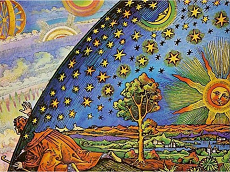The concept of absolute time was a foundational concept of physics as articulated by Isaac Newton in the 1600’s. It was overturned by Einstein’s Theory of Special Relativity, published in 1905.
According to Newton, absolute time exists independently of any observer. It progresses at a regular pace throughout the universe. Everyone, no matter where in the universe, experiences the same moment of time simultaneously. “Now” on one side of the universe is the same moment as “now” on the other side. It is as if a giant clock ticks throughout the huge empty stage of the universe. This clock would measure off what Newton called “true time.”
Einstein’s Relativity overturned the idea of absolute time and of a clock ticking throughout the universe. Instead, people and objects traveling at different speeds experience time differently. It’s not that there’s an objective true time and their psychological sense of it is experienced differently. No, their clocks actually run faster or slower depending on their relative speeds. And, it’s not that something happens to their clocks that makes them work funny. It’s that time, itself, slows in certain situations.
You might wonder, what does it mean to say that “time, itself, slows”? Here’s an analogy. Imagine that you were a character living in a movie. You think the movie is the real universe, and you can perceive nothing outside of it. You eat, breathe, think and move inside the movie as do the other characters and all the objects in the sets.
Your life moves along frame by frame and everything is just fine. But then, the movie projectionist slows down the feed of the filmstrip into the projector. Everything would slow down for you. This includes your thought processes, your heartbeat, your speech, and your movements as well as everyone else’s. And so does the screechy zig-zags of the inevitable car chase—it slows down, too.
What would you as this character feel? Probably, nothing unusual. Because you would think slowly and live slowly in a slowly moving set. Every motion would be paced relative to every other motion, just as it was before. Things would seem completely normal to you.
However, people watching the movie wouldn’t be so accepting. They would shout to the projectionist to fix your world. Their time is running at a different pace. After the movie, they have things to do and people to see. So, time is running at different speeds for you, the character in the movie, and for the audience.
In our universe, this is how time works. The pace of time, in some situations, is is seen differently by different observers. This occurs when observers are traveling at different speeds. We don’t usually notice this effect because in everyday life, we don’t travel at the speeds necessary to trigger really significant differences in the pace of time, speeds that approach the speed of light.
Relativity of simultaneity. Another consequence of Relativity is that, in many situations, it’s no longer possible to say that two events are simultaneous for everyone throughout the universe. One observer might experience two events as happening exactly at the same time whereas another person in motion relative to the first would see the events as consecutive rather than simultaneous. This is called the relativity of simultaneity. For more information on the relativity of simultaneity, see:
Professor Richard Wolfson, Middlebury College, Einstein’s Relativity and the Quantum Revolution, The Great Courses audiobook, 2nd edition; The Teaching Company, 2000; Lecture 10.
Brian Greene, The Fabric of the Cosmos: Space, Time, and the Texture of Reality; Vintage Books, New York, 2004; page 55.
